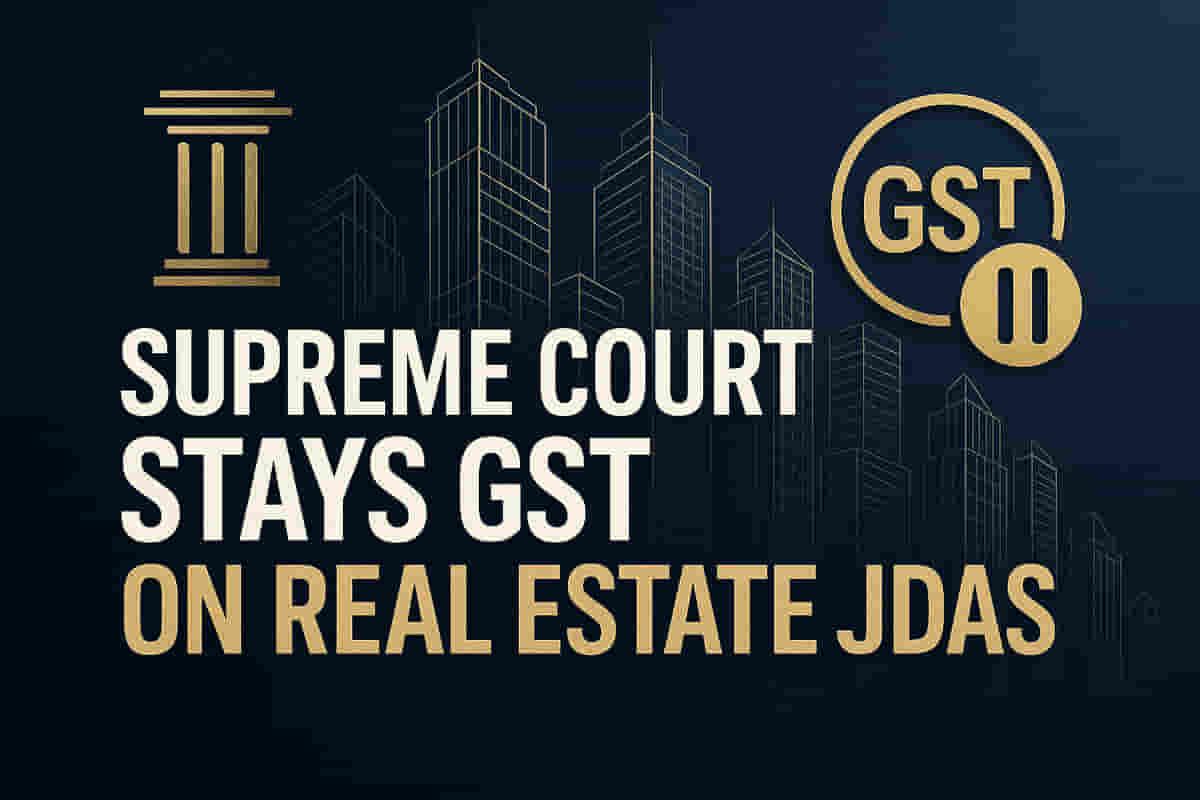Supreme Court Halts GST Demand on Real Estate Joint Development Projects
Real Estate
|
30th October 2025, 7:26 PM

▶
Short Description :
Detailed Coverage :
The Supreme Court has issued an interim stay on a Goods and Services Tax (GST) demand against real estate firms Arham Infra Developers and Nirmite Buildtech, who were involved in a project under a Joint Development Agreement (JDA). This development is significant because JDAs are a common method for developers to access land without immediate purchase, allowing them to partner with landowners.
The Dispute: Tax authorities have been trying to classify the transfer of land development rights within JDAs as a taxable 'supply of service' under GST. However, developers argue that the underlying transaction is essentially a 'transfer of land', which is exempt from GST.
Supreme Court Action: A bench of Justices Aravind Kumar and R Mahadevan stayed the operation of an assessment order from January 27, 2025, and issued notices to the central government. The matter is scheduled for further hearing. This intervention by the apex court revives the debate on GST applicability in JDAs, overturning a previous refusal by the Bombay High Court to grant a stay.
Legal Perspective: Experts like Abhishek A Rastogi state that JDAs are structured mechanisms for land interest transfer. Since the sale of land is outside GST's scope, taxing development rights is seen as an indirect tax on land, potentially leading to double taxation when the final units are sold.
Broader Impact: This ruling is crucial for the real estate industry, where JDAs are prevalent in urban redevelopment and new projects. It follows a Bombay High Court ruling in August which clarified that GST is not payable once land ownership is transferred to the developer.
Impact: This Supreme Court stay provides temporary relief to developers and landowners involved in JDAs and could lead to a significant re-evaluation of GST policies related to land development agreements nationwide. Rating: 7/10
Difficult Terms:
Joint Development Agreement (JDA): An agreement where a landowner allows a developer to construct a project on their land. The landowner typically receives a share of the developed property or revenue in return for contributing the land.
Goods and Services Tax (GST): A consumption tax levied on the supply of goods and services in India.
Taxable 'Supply of Service': Any act or activity that is considered a service under GST law and is liable to be taxed.
Purview of GST: The scope or extent to which GST laws apply.
Assessment Order: A formal decision by tax authorities determining the amount of tax due.
Special Leave Petition (SLP): A petition filed to seek leave from the Supreme Court to appeal against an order of any court or tribunal in India, except for military, tribunal, or administrative matters.
Writ Jurisdiction: The power of a court to issue writs (orders) to government authorities or lower courts.
Statutory Appellate Authority: An official body established by law to hear appeals against decisions made by tax or administrative authorities.
Deferred Consideration: Payment for a transaction that is made at a later date, rather than at the time of the transaction.
Legislative Intent: The purpose or objective that lawmakers intended to achieve when passing a law.
Double Taxation: When the same income or transaction is taxed more than once.
Urban Redevelopment: The process of renovating or rebuilding older parts of a city.
Greenfield Projects: Projects developed on undeveloped land that has not been used for industrial or commercial purposes before.
Judicial Churn: Ongoing debate, uncertainty, or changes in legal interpretations by courts.